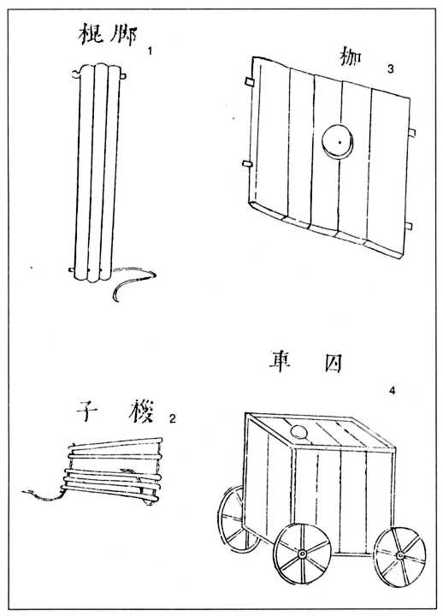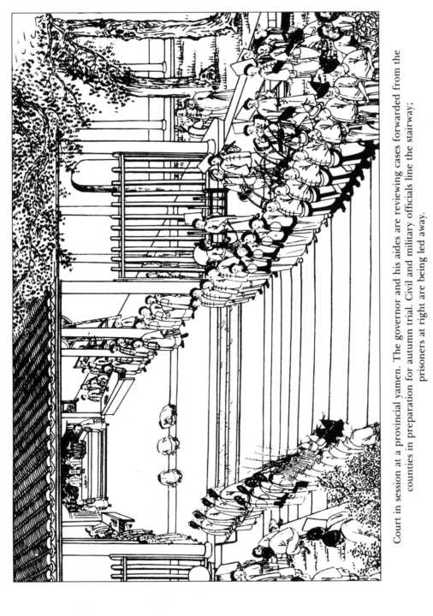Soulstealers: The Chinese Sorcery Scare of 1768 (4 page)
Read Soulstealers: The Chinese Sorcery Scare of 1768 Online
Authors: Philip A. Kuhn


"The ankle-press at work.

Various authorized torture ("punishment") implements:
(i) the ankle-press;
(2) a device for squeezing the fingers;
(3) the cangue;
(4) a prisoner transfer cart.

Ever since their first encounter with the Hsiao-shan authorities,
Cheng-i and Ch'ao-fan had stubbornly clung to the story that constable Ts'ai had arrested them falsely, because they had refused him
money. This was a story common enough in local society. Yet who
would believe these ragged monks? Could the public hysteria about
sorcery be wholly groundless? And what of the concrete evidence
Ts'ai had produced from Chu-ch'eng's baggage? At neither the
county nor the prefectural level were the monks believed. Now the
provincial judge, Tseng Jih-li, pursued the same line of questioning:
Judge Tseng: Chu-ch'eng, you're a beggar-monk, so you naturally have
to beg for your vegetarian food. But how come you had to ask the
name of someone's child? This is crystal-clear proof of your soulstealing. When you made your first confession here, you wouldn't
admit that you had asked the child's name.
Chu-ch'eng: ... That day, at the county yamen, I said I had asked his
name, so the magistrate kept asking about soulstealing. The attendants gave me the chia-kun three times, and my legs still haven't
healed. I was really scared, so when I arrived here and Your Excellencies questioned me, I didn't dare say anything about asking the
kid's name ...
Judge Tseng: ... If there wasn't solid proof that you did these things,
how come the crowd was so angry that they wanted to burn you or
drown you?
Chu-ch'eng: . . . When they saw the parents had grabbed us, they all
suspected we were soulstealers, so they shouted about burning and
drowning us. Really, that was all just guff. Later, when the headman
took us to the post station, the crowd all went away ...
Officials at the grand provincial yamen were apparently less
inclined to coddle police underlings than were officials at the county,
who depended on the likes of constable Ts'ai to carry on their daily
business. As the prisoners cowered before the provincial judge,
Cheng-i repeated his tale of attempted extortion. Ts'ai Jui, he
insisted, had told them that day in the temple that he had been
ordered to arrest "vagrant monks" and would let them off only if
they paid him the "customary fee." Cheng-i had answered, "We're
beggar monks. Where are we going to get money to pay you?"
Something about Cheng-i's story struck judge Tseng as plausible.
Men like constable Ts'ai were not professional police, but belonged to the general category of local underlings known as "government
runners" (ya-i). They performed many distasteful and demeaning
local jobs such as torturing suspects, serving summonses, "urging"
the payment of taxes, and running miscellaneous errands around the
government offices. Those who, like Ts'ai, did police work were
considered to be of "mean" status and not permitted to sit for civilservice examinations. They were paid little and had to support themselves by demanding "customary fees" from all commoners whom
they dealt with. Some "runners" were not even on the official rolls,
but were destitute men who had attached themselves as supernumeraries to others. These received no pay at all and simply preyed
upon the public. It was commonly said that runners were a low lot
and had to be kept in check, yet few officials could do so because the
runners' services could not be dispensed with.16
Now constable Ts'ai was brought forward and made to kneel.
Though Judge Tseng probed at his story, Ts'ai clung firmly to it,
and was left kneeling for the rest of the day. At last the exhausted
man realized that the game was up. Indeed, he now confessed, he
had demanded cash. When the monks balked, he proceeded to search
their baggage: "Where did these things come from? Now if you don't
fork over several strings of cash, I'll take you to the county and say
you're queue-clippers."
With the discovery of the compromising scissors and queue-binder,
the stakes rose. As the shouting match grew louder, the inevitable
crowd gathered. Amid the hysteria, Ts'ai sensed more trouble than
he could handle. He persuaded the crowd to disperse by arresting
Cheng-i and dragging him off. Instead of taking him directly to the
county yamen, however, he brought him and the incriminating baggage to his own home, located in a blind alley which backed onto the
city wall. He was followed by the irate Ch'ao-fan, who demanded his
traveling box. "I'll give it to you only if you bring in those two other
monks," said Ts'ai. Ch'ao-fan, fuming, set off for the yamen to
protest.
Constable Ts'ai's confession went on. Once safely in his own house
with the chained Cheng-i, he said, "Now that everyone's gone, just
cough up a few strings of cash, and I'll be glad to let you escape."
But the outraged monk insisted that he was going to file an official
complaint. Ts'ai started beating him, but without result. He realized
that he was in serious trouble unless he could make the queueclipping charge stick. Unfortunately, there was only one lock of hair in Chu-ch'eng's box; furthermore, it was straight hair and did not
really resemble a clipped queue-end. So Ts'ai found an old lock of
hair in his own house, went out in the alley where Cheng-i could not
see him, and carefully braided it. For a bit more evidence, he cut
some strands of fiber from his own hat fringe and braided them up
to resemble two little queues. This hastily concocted evidence he
placed in the monk's traveling box along with his own pair of scissors
(making a total of four), and marched his prisoner off to the magistrate's yamen.
There, even under torture, Cheng-i clung to his extortion story.
But the magistrate sagely pointed out that there was obviously no
bad blood between constable Ts'ai and Cheng-i, the two being total
strangers, so Ts'ai could have had no motive for framing him. On
this basis, the case had gone up through the prefectural court without
being suspected.
Now that Ts'ai had confessed to the frame-up, however, judge
Tseng turned the case back to the Hsiao-shan County authorities.
The constable was beaten, exposed in the cangue, and finally let goperhaps a more circumspect guardian of public order. The monks
were freed, each with 3,200 cash to sustain him while his broken
bones healed.
Popular hysteria and petty corruption had nearly resulted in a
serious judicial error. Courtroom torture had elicited confessions, but
these were compromised by the accuseds' complaints before higher
authorities. Once the case reached the provincial level, the bias
against the accused was balanced by the worldly-wise skepticism of
high officials far removed from the pressures and temptations of
grubby county courtrooms. A case of sorcery? More likely, the usual
nuisance of a credulous rabble abetted by greedy local police ruffians
and incompetent county authorities: a case the province was now
happily rid of.
Yet the tide of public fear was stronger than judge Tseng and his
colleagues knew. The same day that Chu-ch'eng and his friends were
arrested, persons elsewhere in Hsiao-shan had beaten an itinerant
tinker to death because they believed that two charms found on him
were soulstealing spells. Officials later discovered that they were conventional formulae for propitiating the Earth deity. The unlucky
tinker had been carrying them while cutting trees in his ancestral
cemetery. A week earlier in An-chi County, which bordered Tech'ing, the epicenter of sorcery fears, an unidentified stranger with an unfamiliar accent had been roped to a tree and beaten to death
by villagers on suspicion of soulstealing."
Within a fortnight, rumors of soulstealing in Chekiang had spread
to Kiangsu. Soulstealing (by the queue-clipping method) was believed
to be practiced by itinerant beggar-monks from Chekiang, who were
entering the neighboring province to practice their loathsome craft.
The local authorities were alerted. Likely suspects were quickly
found.
The Beggars of Soochow
In Soochow, an ornament of China's most elegant urban culture, seat
of the governor of Kiangsu, China's richest province, on May 3, 1768,
local constables seized an old beggar of "suspicious" appearance. The
charge was clipping queues for the purpose of soulstealing.'s Local
authorities did not, however, allege an association between queueclipping sorcery and the political symbolism of the queue.
The ragged creature who was dragged into the constabulary on
that May morning was Ch'iu Yung-nien, a native of Soochow Prefecture. Ch'iu, fifty-eight, was an unemployed cook who had turned to
begging "along the creeks and rivers." By April 26, his wanderings
had brought him to Ch'ang-shu, a county seat just south of the
Yangtze, where he took lodgings at a rooming house. There he met
two unemployed men who, like him, had taken to the road in order
to survive: Ch'en Han-ju, twenty-six, an unemployed "maker of dusters and hat fringes," whose home was Soochow; and Chang Yuch'eng, forty-one, formerly a peddler of dried salt fish. Chang was
the only one from outside the province, having wandered all the way
from Shao-hsing, Chekiang (a journey of i 20 miles along the Grand
Canal). These three marginal men, cast off by the "prosperous age"
of the mid-Ch'ing, found that they were all heading south toward
Soochow, and on May 2 set out together.
By the next day they had reached Lu-mu, a teeming commercial
district north of the Soochow city wall, on the banks of the Grand
Canal. While his companions begged in a pawnshop, Ch'iu squatted
by the roadside. There he was seized by constables from the Soochow
garrison, accompanied by two constables from the Ch'ang-chou
County yamen. He was found to be carrying a knife and some paper
charms. As the constables questioned him, a crowd gathered. Among
the bystanders was a ten-year-old boy, Ku Chen-nan, who told anyone who would listen that earlier the same day he had felt his queue
tugged, but could not see who had done it. That was enough for the
police. Beggars Chang and Ch'en were quickly found and imprisoned
with Ch'iu. The three were tortured with the chia-kun in the usual
manner. Confronted with the incriminating evidence found on him,
Ch'iu insisted that the knife was for making "orchid-flower beans"
for sale. The paper charms (each imprinted with "great peace," t'aip'ing) he would paste on doorways in the market streets and then ask
for handouts. All three steadfastly denied the crime of queue-clipping. The boy, brought in and questioned, repeated his story:
I'm ten years old and I study at the County Academy. On the third of
May, as I was going home, walking north, someone gave my queue a
yank from behind. I turned right around, saw someone running away.
My queue had not been cut. Later I was told that the constables' post
had arrested some men and I was ordered to go there and identify
them. When it happened, I was walking along and the person was
behind me. I couldn't see his face. The man wearing black here, Ch'en
Han ju, looks sort of like that person, but I can't identify him for sure.
